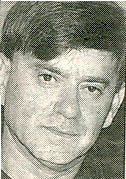
The Shakespeare Foundation of Spain: A Brief History

The Shakespeare Foundation of Spain: A Brief History
Introduction

The origins of the Shakespeare Foundation
go back to 1972, when a number of linguists, under the direction of Professor
Manuel Ángel Conejero Tomás Dionís-Bayer, O.B.E.,
initiated various academic activities related with the study of Elizabethan
theatre in general and the work of Shakespeare in particular. These activities
revolved around the internacional seminars known as the "Shakespeare
Encounters". This, with the help of Professor T.J.B. Spencer from Birmingham
University eventually lead to the formation of the Foundation in 1978,
whose goal is to translate the Complete Works of William Shakespeare into
Spanish.
The Shakespeare Foundation of Spain is a cultural institution whose purpose is that of bringing together those academics, investigators and professionals who have the study of language, and its artistic expression in literature, theatre and cinema as a fundamental objective. The idea that is common to all the cultural and scientific tasks that are undertaken at the Institution is that language is a means of communication and of interpersonal relations. lt believes that dramatic texts are one of the most elaborated forms of language, due to the communicative nature of theatre and cinema.
In 1985, there arose the need to expand the existing institution with an eye to laying down a formal platform for all the artistic and didactic activities that were derived from the initial academic objective. This is how the Shakespeare Foundation came to acquire its current structure.
Since 1972, the twelve editions of the Shakespeare
Encounters have brought together the world's most eminent Shakespearean
investigators: T.J.B: Spencer, Muriel C. Bradbrook, Philip Brokbank, Stanley
Wells, Geogio Melchiori, Jan Kott, M.T. Davies, Marvin Spevack, Anne Jennalie
Cook, Rusell Jackson, Ingeborg Boltz, Norbert Greiner, Tom Matheson and
Roger Pringle, among many others. The various investigators' publications
appear regularly in the En Torno a Shakespeare series, which is
edited by the Foundation itself and of which five volumes have so far appeared.
The Translations
To date, the following works have bcen published in bilingual editions: King Lear (1979), Macbeth (1980), The Merchant of Venice (1982), As you like it (1983) Othello (1984), Romeo and Juliet (1987), Twelfth Night (1988), Hamlet (1989), The Tempest (199 1) and Richard II (1 992). The following are in the process of publication: Coriolanus (1993) and Anthony and Cleopatra (1994). All these editions are the friut of a long process of verbal investigation: bibliotextual, lexicographic, poetic, theatrical studies, and research into the literary sources.
These versions of William Shakespeare's dramatic works reflect a very particular way of realising the translation process, and of understanding the original. This is not just a literary text, but rather it is fundamentally a score which contains all the information necessary so that the actor and director can undertake their performance in the most efficient manner possible.
Relations with Theatre
Given that our translations are conceived especially for the stage, there exists a rich and intense relationship with professional theatre companies. Examples of such are to be found in the performances of Macbeth (Madrid, 1980), and King Lear (Madrid and Valencia 1982), both directed by Miguel Narros; As You Like It (Valencia and Madrid, 1986), under the directorship of Pierre Constant; Romeo and Juliet (Madrid, Valencia and London, 1987), Macbeth (Madrid, Almagro and London, 1990 and 1991), directed by Edward Wilson; and The Tempest (Valencia, 1993) directed by Christopher Sanderson. The cat on a hot tin roof (Valencia, 1996) directed by Mario Gas; The King Lear (Valencia 1997) directed by Miguel Narros.
Actor Training
From the series of classes for actor training in the last ten years, developed by Professor M.A. Conejero Dionís-Bayer, in 1984 the Cátedra-Laboratorio de Actores was established in both Madrid (with the collaboration of the city's Ateneo Científico, Literario y Artístico) and Valencia.
The fruit of the work undertaken with the Cátedra student was displayed in 1995 with Dioses Nocturnos, and later in April of 1996 with Hamlet in the Mirror, both of which are M. Conejero Dionís-Bayer's works.
At present, the Cátedra-Laboratorio de Actores has Hamlet in the Mirror and The Rose and the Thorn in its repertoire, along with other Shakespearean texts.
The World Shakespeare Congress
The Shakespeare Foundation of Spain is organising the World Shakespeare Congress 1997-2001 with the help of the Valencian Institutions (Council, Regional Govemment) that have become closely involved with this event, as has the Department for Education and Culture in Madrid. The Shakespeare Foundation regularly co-ordinates and hosts preliminary activities for the congress in Valencia, the World Shakespeare City, with the aim of creating a fitting climate about the figure of Shakespeare. Some of the preparatory encounters that have been celebrated to date are: Seminar The Popularity of Hamlet, a conference on Hamlet, the opening of Kenneth Branagh's Hamlet, the theatrical work Hamlet in the Mirror, the theatrical offering On Innocence and Experience the poetic recitals The Rose and the Thorn, academic courses on Ausiàs March and the European Renaissance... All these events aim to promote the study of the English playwright, and to establish an interrelation with Spanish writers of the same epoch.